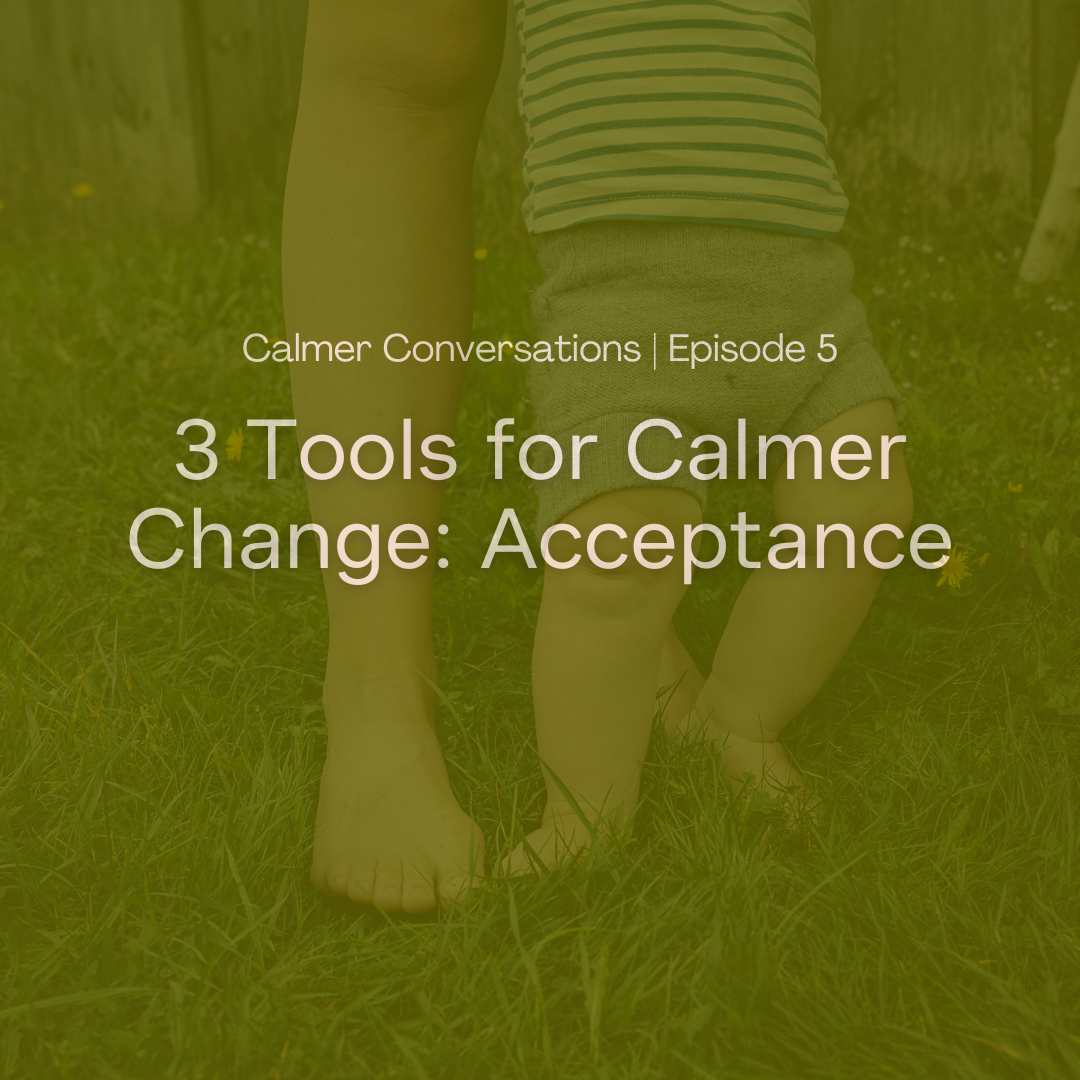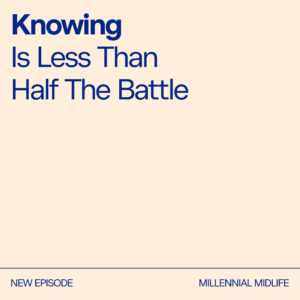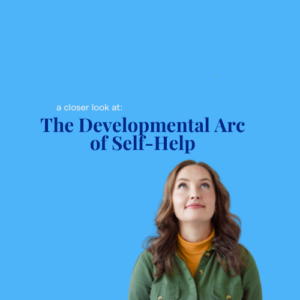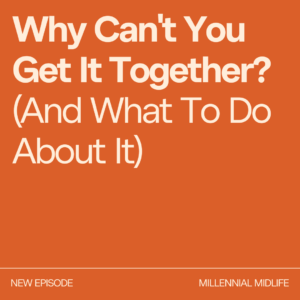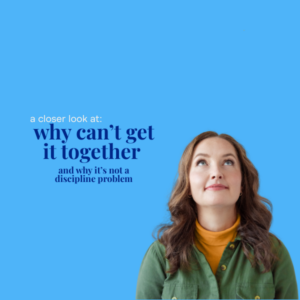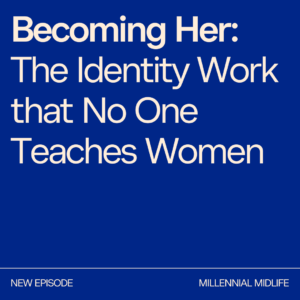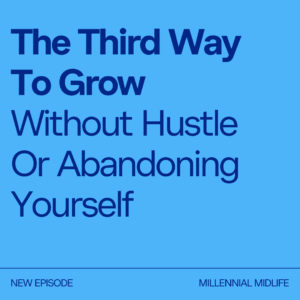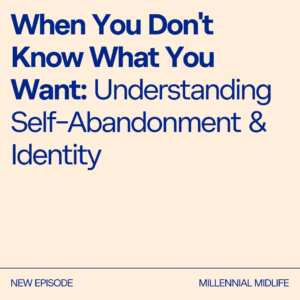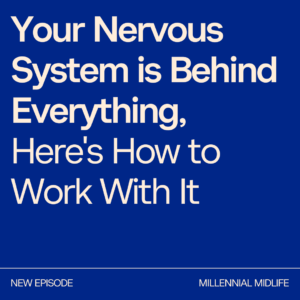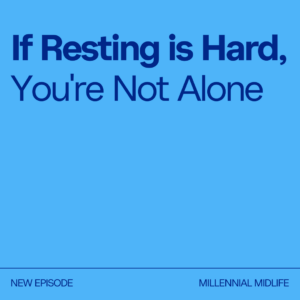Cecelia Baum Mandryk (00:04.526)
Hey, and welcome to Calmer Conversations, episode number five. I’m Cecilia, your host. Let’s get started. Okay, so right now we’re in the middle of a mini three -week series on working with your brain and nervous system. And I’m talking about the three specific tools that I use and teach over and over again. So I use them with myself over and over again, and I use them with my clients over and over again in different permutations.
And I really feel like most of the work that we do comes back to these three tools. They just manifest in different ways and we use them in different ways. Those three tools are awareness, acceptance, and curiosity. Last week we talked about awareness and so this week we’re diving into acceptance. But first I think we should do a short recap on awareness just so if you haven’t listened to that episode, you can feel like you have a basis for where we’re going this week.
Okay, so what do I mean or what did I talk about last week when I said awareness? So when I say awareness, I’m specifically meaning non -judgmental awareness, which is awareness that involves being aware of what your brain does automatically. So noticing what your brain says to you or how it judges situations or how it interprets things, plus the capacity to sit with your thoughts and sensations without reacting to
So it’s about observing and experiencing things without labeling them as good or bad, right or wrong, or really needing them to make sense in any certain way. So it’s starting to see them as an observer, as a gentle observer is another term that I used last week, instead of as a judge, as somebody who needs things to be a certain way, instead of getting caught up in your own drama or story in your brain. And this awareness,
So today, earlier today actually, in our club coaching call, somebody brought up something that happened. And then they mentioned at the end of the call, they came back around and they said, I think actually a win is that I even noticed this, that last year I would not have been aware of this behavior. I would not be aware of the loop that my brain was in. And so I couldn’t make the changes that I’m able to make
Cecelia Baum Mandryk (02:19.34)
And I think that really captures how powerful awareness is. Awareness is one of these things that we can think like, I mean, I even said it last week in the episode, it’s really easy to say like, yeah, I’m totally aware of everything that I do. I’m totally aware of how I get stuck in different things and what’s happening. But the truth is you might be like, superficially aware, right? So aware of things on the surface, but you might not be aware of what’s happening underneath and the stories that are happening in your brain.
in a way that is non -judgmental and accepting, which is what we’re gonna go in today. And when you can see things, when you actually can be aware of them in a way that’s not making them right or wrong, that’s not making yourself right or wrong, then you can start to work with them and change them. And so it is crucial to develop this skill, this muscle of awareness and noticing yourself so that you can start to work with these patterns in your brain.
Right, I’ve used in the podcast and in other classes and on Instagram and TikTok, I’ve used this example of your brain really operating on lines of code, like an open source computer program. And when your brain is operating on these lines of code, most of the time we’re not aware of them. They’re just running in the background, like the computer programs that you use or the apps that you use, they’re these lines of codes and they’re just happening and things kind of are just happening
and we’re not even aware of the lines of code that are directing how we feel and what we do day to day. And when we start to become aware of them, then we can start to bring some intentionality to how we feel and what we do in our life, right? We can start to become aware of the lines of code that are directing what is going on within ourselves. And this awareness without it, it’s really hard to make changes. And so that’s again why it’s the first skill.
that I list and the first tool that I list and why you could almost spend an entire lifetime building awareness. I’m going to take a quick detour into this tool that I use a lot in the somatic sessions that we have in the groups that I run. And somatic sessions are really dealing with your non -cognitive brain as kind of how I use it as a big blanket term. And so we do things like breath work and guided meditation, and we do some movement. And it’s really to work with your body and nervous system and your non -cognitive brain to start to make shifts and changes.
Cecelia Baum Mandryk (04:39.862)
One of the tools that we use over and over again is yoga nidra. And I use I -Rest yoga nidra, which Richard Miller is kind of the founder or the codifier of that, of a really specific yoga nidra that is a more ancient practice and tradition. And what I really love about this practice is the entire guided meditation is about helping you step into being the one who is aware of what’s happening.
being the one who is aware of physical sensations that you’re having, one who is being aware of what’s happening in your brain, of feelings that are coming up, of stories you’re telling yourself, of your breath, of joy, of your capacity to be the one who is aware. And I think that this refers when you can start to develop this, and I called it a muscle earlier, and I really think that it is, when you start to develop this muscle, you start to recognize that you, like the you that is behind,
There is a you that’s behind your ego. There’s a you that is behind your day -to -day experience. And that’s the person we want to tap into to create this really lasting sense of calm and contentment and satisfaction and peace and happiness and joy that you can then carry out into your lived experience and world. So that’s my quick little tangent on a side. I just think it’s so awareness is like, it’s just so powerful for you to develop.
Again, I’m gonna go back to the muscle thing. sometimes, I mean, most of us would say that if you wanna be strong in your life, like physically strong, you don’t just go to the gym one day. I’m recording this on Tuesday, July 30th. You don’t just go to the gym Tuesday, July 30th and do 10 pushups and a couple pull ups and like some leg work and like think, okay, now I’ve done it for the rest of my life, right? Now I’m good, now I’m gonna be strong. We understand that in order to have continued strength in our physical body or cardiovascular,
that we need to continue going back and doing things, right? We go for walks daily. We maybe go to the gym several times a week and lift weights, or we do yoga or Pilates or something like that. And we do it regularly because we’re cultivating health and wellness in our bodies. And these muscles that we’re creating, these neural pathways that we’re creating in our head and our brain, our kind of like being behind this, are the same thing. And so they’re things that you don’t just connect with once.
Cecelia Baum Mandryk (07:00.046)
You just do one guided meditation, you’re like, all right, I’m good, I’m like aware forever. Although that could happen, right? You could just like flip a switch and be that. It’s a practice of becoming that person. And this is said over and over again from clients when I talk about feedback and what they’re getting from it, they really say like, now I get that this is a process of becoming.
Now I get that this is a process of shedding layers, of rewriting code, of doing this work over and over again and intentionally coming back over and over again so I can make changes that I want to make because it is important for me to feel peaceful. It is important for me to feel joyful. It is important for me to feel calm in my life and have that sense of being within my life. And in order to do that, I’m willing to come
in the same way that if somebody says health is really important to me, they’re willing to go to the gym over and over again, right? They’re willing to devote hours of their life to moving their body because it’s really important to them that they’re healthy, that they’re able to walk and move and enjoy life, have a great quality of physical life as they move through the journey and the arc of their life. Okay, so that’s another, a whole other episode essentially on awareness and why it’s important, but really truly
If you can take away something from the awareness episode last week and this right now, it’s that building awareness and this non -judgmental ability to see what’s happening in your brain, to be able to connect with the emotions that are happening, to be able to name them, to be able to name what’s happening in your body, to be able even to name what you’re doing at any moment and to say it not from a place of judgment of yourself, but just, this is what I’m engaging in. I’m scrolling on my phone right now. And to say that and become aware of it
hugely powerful. So please don’t underestimate awareness as a starting point and something that you could, again, mostly spend this entire lifetime working on. But we’re, for the sake of growth and for the sake of a podcast, in this episode, we’re moving on to acceptance. And so what do you do with this non -judgmental awareness? What I work on a lot with my clients is we move into acceptance
Cecelia Baum Mandryk (09:07.064)
We’re gonna talk a little bit about the kind of vernacular and the semantics between acceptance and condoning. But first, I just wanna talk about why acceptance is so powerful in your nervous system. So in the nervous system episode, we touched on this a little bit, but I’m gonna go into it again here, is that when you are in resistance, and resistance is the opposite of acceptance, but it is also when you become aware of something, like I just used the example of I’m scrolling on my phone.
or my brain is telling me that if my brother acted in a certain way, I would feel better. Or if this wasn’t happening in my life, if my boss didn’t email me at 10 p then I wouldn’t feel so stressed. If you’re once you become aware of what’s happening, I’m feeling anxiety in my body, feeling a tightness in my chest. Oftentimes what we do as people, we think that the path to change is pushing against
So we say, I shouldn’t feel this way. This shouldn’t be happening. Things should be going differently. And as soon as we get into resistance, what happens is our nervous system moves from the regulated parasympathetic space, wherever you are along that continuum and cloud probably more likely than a continuum as most things are, you move from a more regulated space to a less regulated space.
And what happens there, so this is from the parasympathetic to the sympathetic response, if you’re familiar with those terms, what that means is that your brain sees a slight danger. There’s a slight push against things. And as soon as that happens, you lose your connection to connecting with other people and yourself, to cognitive thinking, to creativity.
to being able to change, to being able to see the larger picture and believe in your capacity to do something different. And so once you resist something, you say, this shouldn’t be happening, I don’t want this to happen, I want something else, essentially what you’re doing, whether it’s with your own behavior or somebody else’s, you’re pushing yourself into that sympathetic space and you’re making it harder for change to happen. You’re making
Cecelia Baum Mandryk (11:29.42)
Not impossible, but it’s a lot harder. It’s like instead of rolling something, a big rock, along flat ground, all of sudden now you’re starting to roll it up hill. So you’re just working against yourself. And most of us don’t want to do that, or most of us have been doing that, and we recognize that in some way we think we’re making things harder for ourselves and we’d like to make things easier. And so acceptance, I think, is the key to that. And this is, if you’re familiar with Byron Katie and the work,
This is a lot of what she talks about. And again, this is not a new concept in the same way that like awareness, like I didn’t come up with this, right? We’re just framing it in a way and in a context that I actually use with my clients. And so I’m saying it maybe in a slightly different way than you’ve heard before, or maybe I’m using different words or examples than what you’ve heard before. But Byron Katie really goes into this, right? And the acceptance of what is, right? She has this quote around like, you can argue with reality, but you’ll lose, you’ll end.
Like you’ll lose only 100 % of the time, something like that. probably butchered it, but you can look it up. And she’s talking about moving into this resistance, right? Like when we reject reality, when we resist reality of whatever is happening around us, of what is going through our brain, when we push against what is, it makes it harder to move into peace and acceptance and calmness, and then doing what you want to do.
Because ultimately most of us want to do something different or we want to feel something different or we want to think something differently in our life. But in order to get there, first you have to get on the bridge. If we’re crossing some like, you know, canyon or something, you have to get on the bridge. You have to be aware of what’s happening, what’s keeping you from where you want to go. That’s the awareness. Then you have to accept what exactly is happening. And then you can start to move
Right, so this acceptance piece is really key. I think within wrapped up in acceptance is also processing emotions. It’s also being present to what’s happening in your physical space and your reality around you. It’s also recognizing the thought patterns that you have and being okay with them and asking what they’re actually giving you. It’s asking questions like how does this or does this not support me in some way? So this acceptance piece
Cecelia Baum Mandryk (13:47.038)
is actually quite big. It’s really juicy and it’s easy for us not to want to do it. It’s the place where most of us don’t want to feel heart emotions. Most of us don’t want to accept that we’re frustrated with our kid. Most of us don’t want to accept that we just yelled at somebody that we love. Most of us don’t want to accept that we just failed to go to the gym for the fifth day in a row. We don’t want to accept this. In fact, we think that if we accept it, it will make
It will perpetuate whatever we have done, right? So we get in this interesting thought pattern that when we accept something, it will keep it in place. But the opposite is true. The opposite is true. So instead of, so when we accept something, we actually allow it to change. We think that if we accept something, if we bring it into our knowledge, if we acknowledge it, if we become aware of it, if we say this is what is,
and okay, this is the reality that I’m dealing with, we think it will continue to perpetuate. But the truth is when we don’t process our emotions, when we don’t become okay with our thoughts, when we don’t recognize the patterns we are in with other people in, again, our physical space and reality, we actually perpetuate the patterns that we’re in. So if you want to change the patterns that you’re in, and I’m assuming you wanna make some changes if you’re here, then
beginning is to become aware of the pattern and then to be in acceptance. And this is again what I do in the groups. So if this is like, you’re like, I really want to do this work, but I don’t really know how we’re going to talk a little bit about the how today. But I want to encourage you to think about what it would give you if you were in a space where you could do this work regularly with support each week, right? Where you could have that kind of semantic session, where you could have group coaching, where you could have lessons. So you’re not doing this on your own because in fact, it’s actually
challenging to change all of your neural pathways and all of your ways of operating by yourself in isolation, which is how most of us want to do this work. And we want to do it there because we’re kind of embarrassed or we don’t think we should be having the problems we’re having, or we feel like no one else is dealing with this. And I promise you that everyone is dealing with this. Everyone is dealing with this. These are just human things. These are human ways our brains operate because of how we were raised in the societies we were raised in and we were raised by other humans.
Cecelia Baum Mandryk (16:08.256)
And changing them often takes somebody else seeing what’s happening in your brain to help you shine light on it, to help you bring your awareness and help you move through acceptance with it. Okay, I told you we’re gonna talk a little bit about like the semantics between accepting condone. And I think that I touched on it just a little bit right there, but it’s important one. So I wanna bring it out even more explicitly. Is acceptance is different than condoning?
Acceptance is this non -judgmental saying, this is what’s happening. Condoning is saying, I want this to continue. And oftentimes we think that when we name something and we accept it, particularly when people start to do this work, they think, I’m condoning it and it’s saying I want it to continue. That’s not what we’re doing at all. We’re not agreeing with it in that way. We’re simply saying this is what’s happening. And so again, using the example of
It’s 1 30 in the morning. I’m scrolling on my phone, naming it in that really objective way. And even then saying to yourself, what a very human thing to do. How human of me to be sitting here, procrastinating, going to sleep, telling myself I want to be doing this when I know actually I don’t want to be doing this because I would actually really rather get up to do that walk tomorrow morning. How very human of me.
Nothing has gone wrong. I am okay in this moment. And that’s what acceptance sort of sounds like when I talk through it myself and you might need to find your own words that you use. I’m safe right now in this moment. Even though I’m procrastinating, I accept myself. And the tools that you might use in this space, you might use something like coherent breathing. You might use something like tapping, so EFT if you know that. You might use something else like dance or movement.
something to help your body process the emotions that are coming up around whatever is happening so you can start to move through it. But naming what you’re doing with the awareness, noticing it, right? That was the first step, naming it out loud, non with, you know, an objective, as objectively as you can, as gently as you can, and then accepting it. How human of me. Of course this is happening. This is what I have been doing. And when you extend this to other people, it might sound
Cecelia Baum Mandryk (18:27.982)
Of course my colleague or my friend is late to coffee with me. How very normal of them. They’re often late. I expected them to be early and now I feel frustrated and I can accept that it’s 10 minutes after 10 and they are not here yet. This is the reality that I’m dealing with. And the other really cool thing that happens when you step into awareness and then acceptance is you get a lot of power back in the situation.
you get to start to notice where you have choice, where you have autonomy, where you can set boundaries. And then instead of setting these boundaries or making choices from this place of kind of trying to control somebody else or fix somebody else or fix the situation, you’re actually making them from a place of thinking about a higher outcome or out of love for yourself or however you want to kind of describe that in your own words, because we have all different words that make sense to us or feel good to us.
But really truly, going from awareness into acceptance is just so powerful with your brain because it brings your nervous system back into that parasympathetic place, right? Where connection is available, where creativity is available, where connecting with yourself, I need to say that explicitly because most of us don’t think of that. We just think of connecting with other people, but connecting with yourself is possible again, where acceptance of yourself is possible again.
We’re noticing different cognitive solutions is available to you again. We’re even asking yourself, what do I want out of this situation is suddenly available to you again from a totally different place of being in the resistance. And so oftentimes people ask me like, well, how does this exactly feel? And you need to play around with it, right? So notice again, you can pick something specific to work through. I’ve used the phone example several times of scrolling. So maybe if that’s something you spend a lot of time doing and you’d like to shift
You might practice when you notice you’re scrolling on your phone, you might name it for yourself. It’s 1 .30 in the morning, I’m scrolling on my phone. How very human of me. I’m okay in this moment. Instead of shaming yourself or telling yourself you shouldn’t be doing this or you should be doing something totally different, move into the acceptance and see what it feels like in your body. See what it feels like in your body to instead of push against it and judge yourself and shame yourself and say something should be different here,
Cecelia Baum Mandryk (20:56.578)
Just name it and see if you can be okay with it exactly as it is. Again, this is a muscle, so it’s going to feel very strange at first. It’s also gonna feel like you’re breaking some rule at first, like I’m not supposed to accept this, because I know that. I mean, that’s where my brain went to at the very beginning. I’m not supposed to accept this. This isn’t supposed to be acceptable, but see what it feels like.
See if it can bring you this sense of peace and calm and even groundedness again so that you can start to make choices Different choices for yourself potentially going forward and that’s what we’re start talking about next week when we talk about curiosity and moving through this and moving forward Okay So see if you can play around with what acceptance feels like in your body notice how it feels even just have this intention of like I wonder if I could be accepting of what I do of what happens in my life each day Just to get a sense for
And if you’re having trouble doing this and you want to do it in a supported way, join the club. If you just have questions and you want to reach out or you want to let me know what you think of this episode, send me a message on Instagram or send me an email. I’d love to hear from you. I’d love to hear how this is going or even leave a review if you feel called to do
But know that these two steps, awareness and acceptance, if you take them and you incorporate them into your life in a powerful way, I get emails all the time from people who said like, I’ve made more changes using these two steps than I have years of therapy, or years of doing other things. Know that that is possible and available to you with your human brain, just by becoming aware of what you’re doing and moving into acceptance. Thank you so much for being here today.

